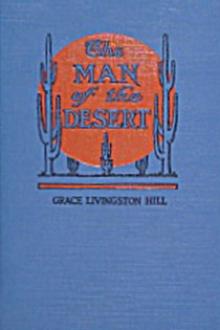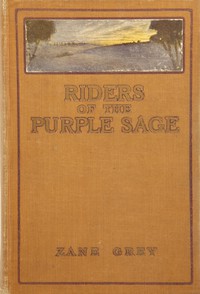The Desert of Wheat, Zane Grey [good non fiction books to read .TXT] 📗

- Author: Zane Grey
Book online «The Desert of Wheat, Zane Grey [good non fiction books to read .TXT] 📗». Author Zane Grey
Long she sat there, staring out into the night. And the change in the aspect of the broad spaces, now dark and impenetrable and mysterious, seemed like the change in the knowledge of herself. Once she had flattered herself that she was an inch of crystal water; now she seemed a complex, aloof, and contrary creature, almost on the verge of tumultuous emotions.
She said her prayers that night, a girlish habit resumed since her brother had declared his intention of enlisting in the army. And to that old prayer, which her mother had prayed before her, she added an appeal of her own. Strange that young Dorn's face should flash out of gloom! It was there, and her brother's was fading.
"I wonder—will he and Jim—meet over there—on the battle-field!" she whispered. She hoped they would. Like tigers those boys would fight the Germans. Her heart beat high. Then a cold wind seemed to blow over her. It had a sickening weight. If that icy and somber wind could have been traced to its source, then the mystery of life would have been clear. But that source was the cause of war, as its effect was the horror of women. A hideous and monstrous thing existed out there in the darkness. Lenore passionately loved her brother, and this black thing had taken him away. Why could not women, who suffered most, have some word in the regulation of events? If women could help govern the world there would be no wars.
At last encroaching drowsiness dulled the poignancy of her feelings and she sank to sleep.
CHAPTER VISinging of birds at her window awakened Lenore. The dawn streamed in bright and sweetly fragrant. The wheat-fields seemed a rosy gold, and all that open slope called to her thrillingly of the beauty of the world and the happiness of youth. It was not possible to be morbid at dawn. "I hear! I hear!" she whispered. "From a thousand slopes far and wide!"
At the breakfast-table, when there came opportunity, she looked up serenely and said, "Father, on second thought I will go the Bend, thank you!"
Anderson laid down his knife and fork and his eyes opened wide in surprise. "Changed your mind!" he exclaimed.
"That's a privilege I have, you know," she replied, calmly.
Mrs. Anderson appeared more anxious than surprised. "Daughter, don't go. That will be a fearful ride."
"Hum! Sure glad to have you, lass," added Anderson, with his keen eyes on her.
"Let me go, too," begged Rose.
Kathleen was solemnly gazing at Lenore, with the wise, penetrating eyes of extreme youth.
"Lenore, I'll bet you've got a new beau up there," she declared.
Lenore flushed scarlet. She was less angry with her little sister than with the incomprehensible fact of a playful word bringing the blood stingingly to her neck and face.
"Kitty, you forget your manners," she said, sharply.
"Kit is fresh. She's an awful child," added Rose, with a superior air.
"I didn't say a thing," cried Kathleen, hotly. "Lenore, if it isn't true, why'd you blush so red?"
"Hush, you silly children!" ordered the mother, reprovingly.
Lenore was glad to finish that meal and to get outdoors. She could smile now at that shrewd and terrible Kitty, but recollection of her father's keen eyes was confusing. Lenore felt there was really nothing to blush for; still, she could scarcely tell her father that upon awakening this morning she had found her mind made up—that only by going to the Bend country could she determine the true state of her feelings. She simply dared not accuse herself of being in unusually radiant spirits because she was going to undertake a long, hard ride into a barren, desert country.
The grave and thoughtful mood of last night had gone with her slumbers. Often Lenore had found problems decided for her while she slept. On this fresh, sweet summer morning, with the sun bright and warm, presaging a hot and glorious day, Lenore wanted to run with the winds, to wade through the alfalfa, to watch with strange and renewed pleasure the waves of shadow as they went over the wheat. All her life she had known and loved the fields of waving gold. But they had never been to her what they had become overnight. Perhaps this was because it had been said that the issue of the great war, the salvation of the world, and its happiness, its hope, depended upon the millions of broad acres of golden grain. Bread was the staff of life. Lenore felt that she was changing and growing. If anything should happen to her brother Jim she would be heiress to thousands of acres of wheat. A pang shot through her heart. She had to drive the cold thought away. And she must learn—must know the bigness of this question. The women of the country would be called upon to help, to do their share.
She ran down through the grove and across the bridge, coming abruptly upon Nash, her father's driver. He had the car out.
"Good morning," he said, with a smile, doffing his cap.
Lenore returned his greeting and asked if her father intended to go anywhere.
"No. I'm taking telegrams to Huntington."
"Telegrams? What's the matter with the 'phone?" she queried.
"Wire was cut yesterday."
"By I.W.W. men?"
"So your father says. I don't know."
"Something ought to be done to those men," said Lenore, severely.
Nash was a dark-browed, heavy-jawed young man, with light eyes and hair. He appeared to be intelligent and had some breeding, but his manner when alone with Lenore—he had driven her to town several times—was not the same as when her father was present. Lenore had not bothered





Comments (0)